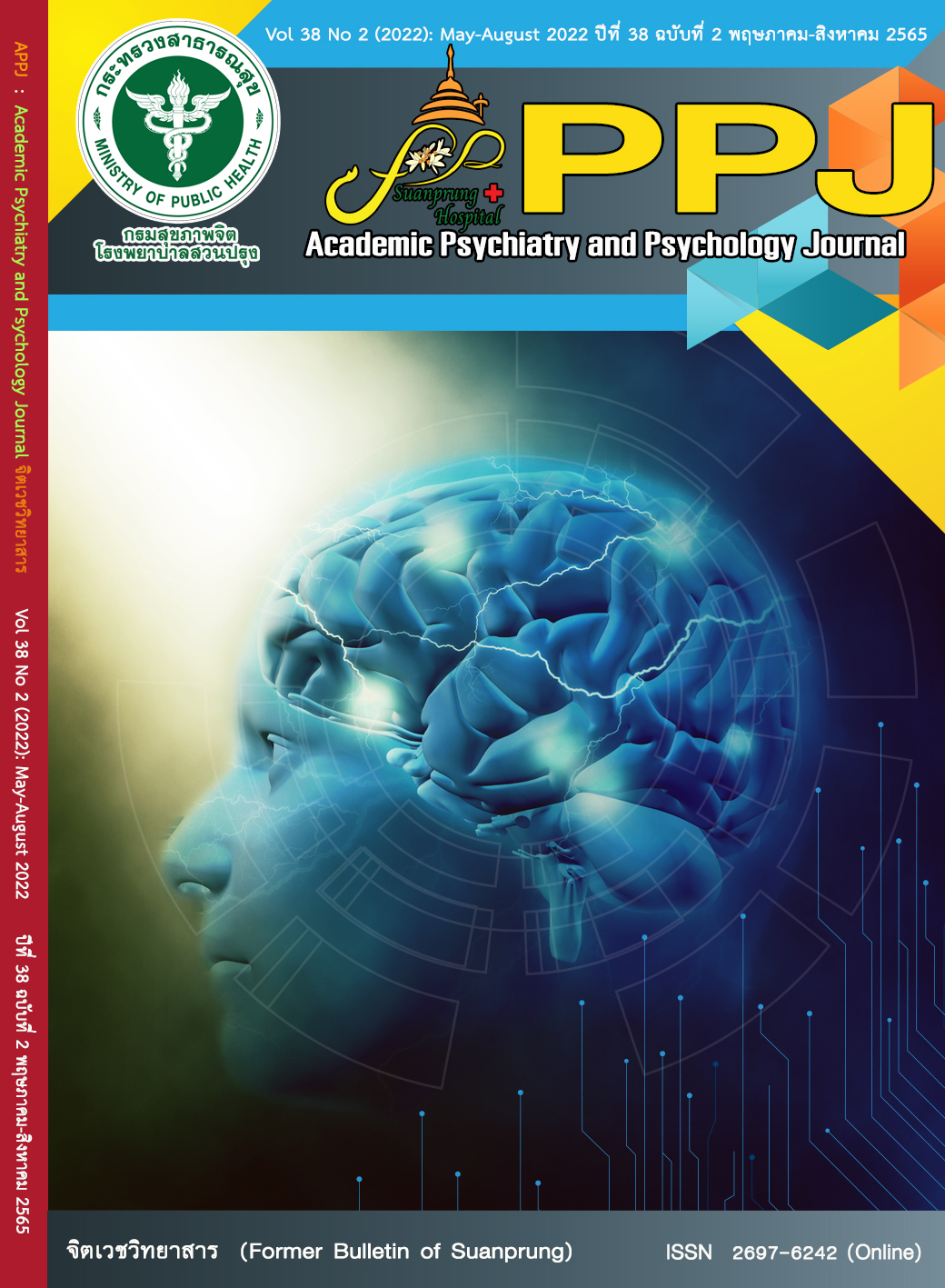Social Stigma During the COVID-19 Pandemic: The Roles of the Psychiatric Nurse
Main Article Content
Abstract
Coronavirus (COVID-19) is a worldwide emerging infectious disease that leads to death. It has sparked social stigma against those infected with COVID-19, a person or a group of people close to the infected one, and those who have recovered from infection. This social phenomenon is due to a lack of knowledge and understanding of the disease, fear of the unknown and unprecedented disease, and the reaction toward others, which is easier to do than prove the facts. As result, the patient develops mental health symptoms, such as anxiety, stress, fear of being discriminated against, as well as experiencing discouragement which could potentially lead to depression. Therefore, this article aims to present the meaning of social stigma, the cause of social stigma, social stigma characteristics, the effect of social stigma on mental health, and the role of psychiatric nurses who provide mental health treatment focusing on mental health promotion, and long-term mental health prevention, in order to apply this knowledge to the mental health treatment for patients infected with Covid-19, their family, and relevant communities to be able to live in harmony.
Article Details

This work is licensed under a Creative Commons Attribution-NonCommercial-NoDerivatives 4.0 International License.
บทความหลังผ่านการปรับแก้จากกองบรรณาธิการแล้ว เป็นลิขสิทธ์ของวารสารจิตเวชวิทยาสาร โรงพยาบาลสวนปรุง กรมสุขภาพจิต กระทรวงสาธารณสุข ห้ามเผยแพร่เพื่อประโยชน์ทางการค้าโดยไม่ได้รับอนุญาต แต่อนุญาตให้เผยแพร่บทความดังกล่าวเพื่อประโยชน์ทางการศึกษาแก่ประชาชนทั่วไป ทั้งนี้กองบรรณาธิการไม่จำเป็นต้องเห็นด้วยกับบทความหรือข้อคิดเห็นใดๆ ที่ปรากฏในวารสารสวนปรุง
References
The Government Public Relations Department. The coronavirus disease situation in Thailand [Internet]. 2022 [cited 2022 Apr 14]. Available from: https://www.facebook.com/informationcovid19/
Chew CC, Lim XJ, Chang CT, Rajan P, Nasir N, Low WY. Experiences of social stigma among patients tested positive for COVID-19 and their family members: a qualitative study. BMC public health. 2021 Sep 6;21(1):1623. PMID: 34488693.
Alkathiri MA, Almohammed OA, Alqahtani F, AlRuthia Y. Associations of depression and anxiety with stigma in a sample of patients in Saudi Arabia who recovered from COVID-19. Psychol Res Behav Manag. 2022 Feb 22;15:381-90. PMID: 35237078.
Perry BL. Contact tracing could exacerbate COVID-19 health disparities: the role of economic precarity and stigma. Am J Public Health. 2021 May;111(5):778-81. PMID: 33826385.
Thanirat S, Radabutr M, Wichianrat S, Opasawatchai S. Strategies to relieve a social stigma on COVID-19. KJN 2020;27(2):164-74. (in Thai)
IFRC, Unicef, WHO. Social stigma associated with COVID-19 [Internet]. 2022 [cited 2022 Apr 1]. Available from: https://www.who.int/docs/default-source/coronaviruse/covid19-stigma-guide.pdf
Centers for Disease Control and Prevention. Reducing stigma [Internet]. 2021 [cited 2022 Mar 20]. Available from: https://www.cdc.gov/mentalhealth/stress-coping/reduce-stigma/index.html
Namwong A, Chaijundee W. A social stigma toward people with COVID-19 or people who may have COVID-19 and its consequences: a qualitative study. Journal of Nursing and Health Research 2021;22:80-95. (in Thai)
Wudhiwong K. Preventative measures to reduce social stigma in universities in Thailand during the COVID-19 pandemic. Payap University Journal 2020;30:1-14. (in Thai)
World Health Organization; Regional Office for Africa. Guidance to reduce COVID-19 stigma on health workers and families [Internet]. 2020 [cited 2022 Mar 1]. Available from: https://www.afro.who.int/sites/default/files/Covid19/Techinical%20documents/Guidance%20to%20reduce%20COVID-19%20stigma%20on%20Health%20workers%20and%20families.pdf
Cullen W, Gulati G, Kelly BD. Mental health in the COVID-19 pandemic. QJM. 2020 May 1;113(5):311-2. PMID: 32227218.
Mental health check in (MHCI). Thai mental health data [Internet]. 2022 [cited 2022 Jun 17]. Available from: https://checkin.dmh.go.th/dashboards
Bhanot D, Singh T, Verma SK, Sharad S. Stigma and discrimination during COVID-19 pandemic. Front Public Health. 2021 Jan 12;8:577018. PMID: 33585379.
Chaiwannawat T. Roles of psychiatric nurses for mental health promotion and mental illness prevention. JPNMH 2017;31:16-30. (in Thai)
Adom D, Mensah JA, Osei M. The psychological distress and mental health disorders from COVID-19 stigmatization in Ghana. Soc Sci Humanit Open. 2021;4(1):100186. PMID: 34250461.
Department of Mental Health, Ministry of Public Health. Mental Health Crisis Assessment and Treatment Team: MCATT COVID-19 [Internet]. 2021 [cited 2022 Mar 3]. Available from: https://www.dmh.go.th/covid19/pnews/files/MCATTupdate.pdf
Ministry of Public Health. Department of Mental Health. Enhancing community mental health vaccines to build community immunity (COVID-19). Bangkok: Beyond; 2022.
Ministry of Public Health. Department of Mental Health. Guidelines for mental care for field hospitals [Internet]. 2021 [cited 2022 Mar 10]. Available from: https://www.dmh-elibrary.org/items/show/1134#?c=&m=&s=&cv=
Thai Health Promotion Foundation. Five steps to positive thinking [Internet]. 2019 [cited 2022 Mar 3]. Available from: https://resourcecenter.thaihealth.or.th/index.php/knowledge-set/VOVX
Budimir S, Probst T, Pieh C. Coping strategies and mental health during COVID-19 lockdown. J Ment Health. 2021 Apr;30(2):156-63. PMID: 33502917.
Ministry of Public Health. Department of Mental Health. Mental health check in [Internet]. 2021 [cited 2022 Mar 5]. Available from: https://checkin.dmh.go.th/#about
Ramaci T, Barattucci M, Ledda C, Rapisarda V. Social stigma during COVID-19 and its impact on HCWs outcomes. Sustainability 2020;12:3834. doi: 10.3390/su12093834.

